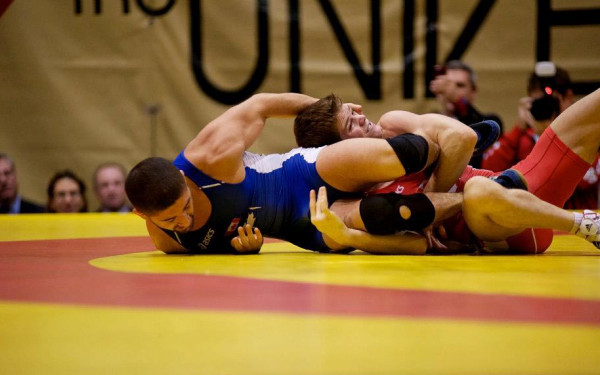Wrestling its Way Back In
‘The World’s Oldest Sport’ is back On the Summer Olympics Program
Wrestling and the Olympics simply go hand-in-hand.
Making its first appearance in the ancient Olympic Games in the eighth century B.C.E., wrestling was also one of nine sports featured in the first modern Olympics in Athens in 1896.
So you can imagine how the world of wrestling reacted upon last February’s news that the sport would be excluded from the Olympics after the 2016 Rio Games.
“I didn’t believe the news when I first heard it,” said Concordia Stingers wrestler and Team Canada member Jordan Steen. “But after it kind of sunk in I thought that it was a pretty big blow. It’s our sport and it was definitely a hard truth to handle.”
In February, the International Olympic Committee removed wrestling from the 25 core Olympic sports. To make it into the Games, wrestling now has to be voted in by delegates of the committee over sports like baseball, karate and squash.
Fortunately for wrestlers the IOC did exactly that last month, guaranteeing that freestyle and Greco-Roman wrestling would be featured through the 2024 Summer Games.
After that, however, the sport’s status is back in limbo.
“It’s politics,” said six-time Olympic coach and Stingers wrestling team head coach Victor Zilberman. “Different sports are trying to get in and [the IOC] tried to put [wrestling] out, but then they found out that the public and the media all around the world were outraged. As a result, they were forced to put us back in.
“Even the people who don’t watch understand that it’s one of the oldest sports and that it’s wrong to take it out of the Olympics,” he continued.
Nevertheless, the sport reportedly lost some of its appeal, dropping in popularity both at the London 2012 Games and in global TV audience, according to the Associated Press.
In an attempt to turn things around, the Fédération Internationale des Luttes Associées, the worldwide governing body for wrestling, is making some changes to the sport.
Starting in Rio 2016, two Olympic men’s weight classes will be dropped in favour of two weight classes for women, improving gender equality.
Rules will also be modified to make matches more dynamic, rewarding wrestlers who are more aggressive. Matches will consist of two three-minute rounds instead of three two-minute rounds, and takedowns will count for two points instead of one.
The rule changes have at least one fan.
“I really like the changes [FILA] have made because sometimes at the high levels, some guys would go into a match trying to score a point and then they would sit back and defend for the whole round,” said Steen, who’s currently preparing to represent Canada at the Commonwealth Championships in South Africa this December.
“Now they’ll have to wrestle more and actually try to beat their opponent.”
Despite its new face, wrestling will have to prove that it deserves its spot, as other sports are patiently waiting their turn.
Among them is softball.
“It doesn’t make a lot of sense to me [for the IOC to] take off a sport in February and then bring it back in September,” said Softball Canada President Kevin Quinn, who would like to see softball back at the Olympics after it lost its status as a core sport in 2005. “It was disappointing of course [not to be chosen]; we certainly worked hard to get back on the Olympic program, but it wasn’t going to happen this time I guess.
“Wrestling is an old sport and the IOC seemed interested in getting it back,” he continued.
They weren’t the only ones.
“I was actually just going to compete in the final when I first heard that wrestling would be back [in the Olympics],” said Steen, who was in France competing at the Francophonie Games at the time, where he won a silver medal.
“[The organizers] stopped the match and we all watched the announcement. It was definitely a big feeling,” he continued.
“It’s the number one goal of every wrestler: to win an Olympic medal.”

_900_600_90.jpg)
_900_600_90.jpg)
_900_600_90.jpg)
_900_600_90.jpg)
_900_600_90.jpg)



1_600_375_90_s_c1.jpg)

_600_375_90_s_c1.jpg)